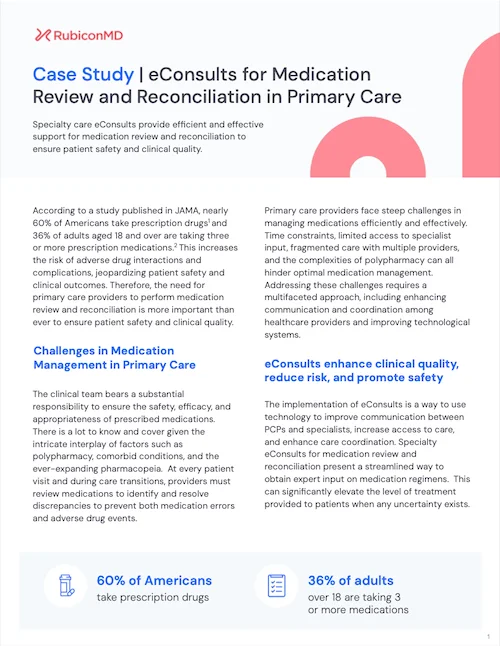eConsults Reduce Specialty Care Fragmentation for Medicare and Medicaid Patients
Primary care providers managing Medicare and Medicaid populations routinely care for patients with multiple chronic conditions, limited access to specialists,…
RubiconMD gives voice to those living in communities where access to high-quality healthcare is scarce. For Black people in ‘healthcare deserts’, deep disparities remain, resulting in more undiagnosed or uncontrolled conditions, increased rates of complications, and mortality. Digital healthcare can help close long-standing gaps in patient outcomes separated by lines of race and prosperity.
In a 2022 Pew Research Report, Black Americans shared disheartening views on the progress of healthcare outcomes for their community in the past 20 years. About 50% of respondents said that health outcomes for Black people have not changed or even gotten worse. What’s driving the lack of progress? Less access to quality medical care was the most common reason, along with environmental quality problems contributing to poor health, or the impression that health systems give lower priority to Black patients. These survey results reflect and bolster the population health data where we see:
Not surprisingly, Black men and women commonly face significant barriers in accessing care, leading to increased morbidity and mortality rates compared to their white counterparts. Recent studies on medical access find one-third of Black Americans living in ‘cardiology deserts,’ with nearly 72% with limited or no access to a cardiologist. These deserts disproportionately affect Black Americans, who are more likely to reside in economically disadvantaged communities lacking the necessary resources and infrastructure for comprehensive cardiovascular services. Black Americans often encounter big barriers that contribute to cardiology deserts and other care disparities, including socioeconomic factors including poverty and unemployment that make it hard to afford high-quality medical care, cultural divides and mistrust stemming from historical injustices or mistreatment, and even unconscious bias from healthcare systems that lead to suboptimal or misdiagnosed care at the population level.
Address disparities by improving access to specialty care:
What can be done today? Unsurprisingly, up to 50% of patients don’t follow through with specialty care appointments if referred for one. RubiconMD offers a digital platform to start closing gaps. eConsult+ allows PCPs to bring seemingly out-of-reach specialty care into the primary care setting. This is especially significant for Black patients living in underserved areas, as it transforms the perception of specialty healthcare from daunting and remote to accommodating and convenient. RubiconMD’s commitment lies in providing equitable access to high-quality specialty care for Black patients across diverse age groups, socio-economic statuses, educational backgrounds, and geographic locations.
Back to the cardiology desert. Even when patients living with heart disease have access to a PCP they know and trust, they still need to address specific or urgent issues like heart failure and heart attacks, along with medication management, and comorbidities like diabetes and depression. RubiconMD standardizes the use of virtual specialists, advancing targeted, programmatic and proactive approaches to care, ProConsult+. With a defined workflow where eConsults are deployed and recommendations are received before a patient arrives at the PCP visit, the end-to-end experience is improved. This approach fosters trust and engagement, leading to improved patient outcomes. Not only does virtual specialty care expand access for Black patients, but it also helps reduce the length of time from diagnosis to treatment, dramatically improving health outcomes for cardio-metabolic patients.
The connection between expanding access and enhancing health outcomes should not be overlooked. And with advancements in equitable digital care, we will continue to break down the disparities.
Ask us about improving access for your patients today.
Primary care providers managing Medicare and Medicaid populations routinely care for patients with multiple chronic conditions, limited access to specialists,…
In a recent RubiconMD CME webinar, “Trauma-Informed Primary Care: ACEs, PTSD, and Chronic Stress,” Ludwing Salamanca, MD, PhD of Columbia…
As primary care providers and health systems transition from traditional fee-for-service models to value-based care (VBC), eConsults are a scalable,…

Explore real examples of specialty care eConsults providing efficient and effective support for medication review and reconciliation.